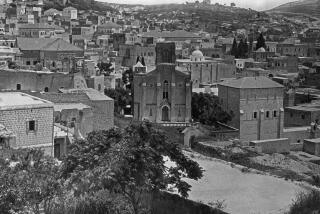Memoir’s a Window Into the War Her Father Never Spoke Of
- Share via
After Culver City pharmacist Norman Steinman died in 1990, his daughter, Louise, director of cultural programs for the Los Angeles Public Library, found an ammunition box in the garage of his condo. It contained 474 letters Norman had written his wife, Anne, from 1943 to 1945, while serving with the U.S. Army in the Pacific campaigns of World War II. It also contained a rising-sun flag marked with Japanese characters and rusty-red spots that may have been blood.
To Louise Steinman, the letters had been written by a stranger--a romantic, expressive young man who had somehow been transformed by the experience of combat with the 25th Infantry Division in the Philippines into the father she’d known: a patriarch who walled off his feelings and never talked about the war; a stolid man prone to unaccountable irritations, upset by the smell of Asian food, the hissing of a teakettle, somebody crying.
The flag, too, opened up unexpected vistas.
Steinman had the writing on it translated and found that it had been signed by relatives and friends of a soldier named Yoshio Shimizu when he left his village near Niigata in Japan’s “snow country” for duty overseas. The flag was given to him “in the Greater East Asia War to be fought to the end,” it read. “If you believe in it, you win.”
The letters didn’t say how Norman Steinman had obtained the flag, whether he had killed Shimizu himself or, more likely, spotted it on one of the corpses littering the Umingan battlefield in northern Luzon in February 1945 and taken it as a souvenir. He mailed it home to Anne, then apologized repeatedly for sending her such a gruesome artifact, for breaching the wall he was already erecting between the war and the rest of his life.
In this memoir, Louise Steinman quotes some of her father’s letters, visits the places in the Philippines where he fought and returns the flag to Shimizu’s family in Japan. Such journeys of reconciliation, as the World War II generation dies off, have become almost commonplace, both in real life and in fiction--for example, in Ethan Canin’s novel, “Carry Me Across the Water.”
Among these accounts, “The Souvenir” is unusual in two ways. The first is Steinman’s doggedness as a researcher, her unwillingness to tell a merely personal story when she can draw broader conclusions about war’s impact on human beings.
She consults Pacific veterans, military historians and psychologists such as Dave Grossman (“On Killing”), who wrote, she says, that “after 60 days of continuous combat, 98% of all surviving soldiers suffer some form of psychological damage.”
In the jungle battle for Balete Pass in Luzon from March through June 1945, in which 2,500 Americans were killed or wounded and at least 14,000 Japanese killed, the 25th Division, including a 29-year-old private named Norman Steinman, fought for 165 consecutive days.
The second notable thing is Louise Steinman’s suspicion of unearned niceness, of too-easy reconciliation.
She is moved by her visit to Japan but points out that Shimizu, described by relatives as a gentle boy, underwent brutal training in an army that committed many atrocities. She faces the possibility that the atomic bombing of Hiroshima and Nagasaki (which saved her father from having to fight in an invasion of Japan) may have been both “inexcusable under any circumstances” and “necessary to bring peace”--an excruciating paradox.
The book’s sole weakness is, perhaps, unavoidable. We learn a lot about the context of Norman Steinman’s war experience, but we don’t--we can’t--learn as much as we’d like about Norman. His letters, however meaningful they may be to Louise, were censored by the military and self-censored by his desire to spare Anne. The full truth of his experience died with him--45 years after the death of the youthful, unwounded self that, Louise says, “the war had stolen away before I was born.”
More to Read
Sign up for our Book Club newsletter
Get the latest news, events and more from the Los Angeles Times Book Club, and help us get L.A. reading and talking.
You may occasionally receive promotional content from the Los Angeles Times.









